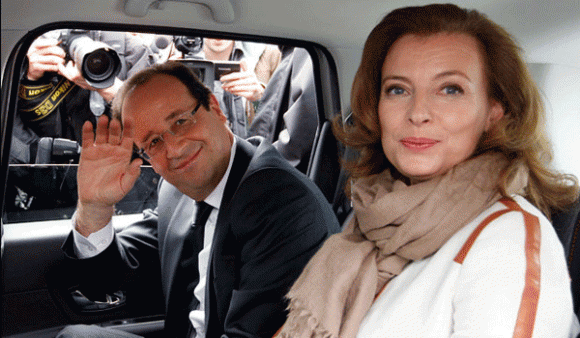
For the first time in 20 years, a French President was invited for a State visit to the United States. François Hollande was greeted with the highest honors, including a colorful pageant on the White House Lawn.
There was no better way to emphasize the historical ties between the two countries than a visit to Monticello, the plantation of Thomas Jefferson, third president of the United States. Jefferson, ambassador to France from 1785 to 1789, was an ardent francophile. But he was also a brilliant statesman — particularly when he bought Louisiana from France in 1808, which probably represented the best real estate deal of all time.

The logistics of the official dinner at The White House were the source of an intense “buzz” as to who would be sitting next to the American president in the absence of a French “First Lady,” after the recent break up of Hollande from his long-time companion, journalist Valerie Trierweiler.
The meeting of the two presidents in Washington had a strong symbolic importance aimed at reinforcing their respective statures on the world scene. France is one of the staunchest allies of the US today. It has an aggressive foreign policy demonstrated by military interventions in Mali and Centrafrique and the essential role it played during the international, ongoing negotiations regarding Syria and Iran.
Last summer the attitude of Obama was widely interpreted a slap in the face for Hollande when the latter was left high and dry after his offer to provide military assistance to the US against Syria. Laying out the red carpet in such a manner on this visit might be interpreted as a form of gratitude toward France.
Most of the difficult questions were asked during the press conference, but both Obama and Hollande chose to avoid contentious topics; criticisms were muted. The resentment felt by France and the rest of Europe about the NSA surveillance was not brought to the forefront. However, Obama did express his discontent about the untimely presence of a group of French businessmen in Iran even before any agreement was signed with that country.
Unlike Sarkozy, Hollande was not invited to speak in front of the US Congress. This is not entirely surprising since the presence of a socialist leader could have ruffled too many conservative feathers.
Since the major press conference Hollande gave at the Elysees palace on Jan. 14, it seems that a government plan to turn around the French economy is developing. The declaration of a “Pact of Responsibility” between the state and the private sector, by waving the obligation to finance social benefits (a reduction of 49% of the cost of labor), constitutes a substantial stimulus for the economy.
This new policy was reaffirmed by Hollande’s remarks made during his stay in California. In fact, many thought he looked as if he were becoming more “Liberal Democrat” by the hour. The exposure to Silicon Valley, dynamic French companies and start-ups, successful young French computer scientists, the stimulating atmosphere of flexible working conditions and the surprising remarks about “crowdfunding” were all, in the minds of many, like fresh air blowing from the West coast.
The French President enjoyed having lunch with the CEOs of giant internet companies like Microsoft, Google, Facebook, Mozilla and Twitter. In 1984, the French President Francois Mitterand similarly enjoyed meeting a certain Stephen Jobs, then 29-years-old.
The stay in California triggered a real “digitalomania” (my own neologism) in France. The media offered multiple talk shows about robotics, artificial intelligence, bio genetics and the like. Analysts pointed out that the information technology was the key to the restructuring of the French economy.
While a major snow storm impacted 49 out of the 50 American states, the French president, flying the northern route, ended his short, but definitely positive, visit to the United States.
 About the author: Nicole Prévost Logan divides her time between Essex and Paris, spending summers in the former and winters in the latter. She will write a regular column for us from her Paris home where her topics will include politics, economy, social unrest — mostly in France — but also in other European countries. She also will cover a variety of art exhibits and the performing arts in Europe. Logan is the author of ‘Forever on the Road: A Franco-American Family’s Thirty Years in the Foreign Service,’ an autobiography of her life as the wife of an overseas diplomat, who lived in 10 foreign countries on three continents. Her experiences during her foreign service life included being in Lebanon when civil war erupted, excavating a medieval city in Moscow and spending a week under house arrest in Guinea.
About the author: Nicole Prévost Logan divides her time between Essex and Paris, spending summers in the former and winters in the latter. She will write a regular column for us from her Paris home where her topics will include politics, economy, social unrest — mostly in France — but also in other European countries. She also will cover a variety of art exhibits and the performing arts in Europe. Logan is the author of ‘Forever on the Road: A Franco-American Family’s Thirty Years in the Foreign Service,’ an autobiography of her life as the wife of an overseas diplomat, who lived in 10 foreign countries on three continents. Her experiences during her foreign service life included being in Lebanon when civil war erupted, excavating a medieval city in Moscow and spending a week under house arrest in Guinea.